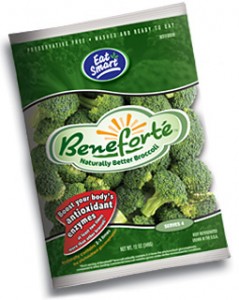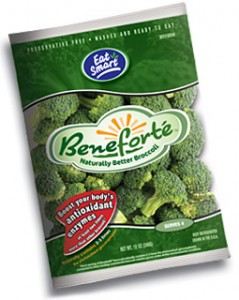 Monsanto’s “naturally better” broccoli.
Monsanto’s “naturally better” broccoli.
Many of us are familiar with Monsanto the seed giant, but who knew the company was making a new ready-to-eat packaged broccoli? The new product is called Beneforté, and it quietly launched last October. This vegetable is not genetically modified (i.e. no pesticides were engineered into its genes), but rather a hybrid of commercial broccoli with a variety native to southern Italy.
Advertised with a “naturally better broccoli” tag line, the selling point pitched at the health conscious is that “it boosts the body’s antioxidant enzymes at least 2 times more than other broccoli.” Specifically, one serving of Beneforté broccoli “naturally contains 2 – 3 times the phytonutrient glucoraphanin [a type of glucosinolate] as a serving of other leading broccoli varieties produced under similar growing conditions.”
“Similar growing conditions” — there’s an interesting tidbit. For all we know, then, Beneforté’s glucopharanin content could pale in comparison to that of organic broccoli. Of course, this obsession with glucoraphanin is a silly and myopic distraction. Broccoli, by virtue of being a vegetable, is healthful and does not need to be improved upon. None of the myriad of chronic health issues affecting millions of Americans are due to “faulty broccoli” with low levels of glucoraphanin.
The biggest irony of this product lies in Monsanto’s claim that Beneforté “help[s] maintain your body’s defenses against the damage of environmental pollutants and free radicals.”
Environmental pollutants? As in, the ones that have have increased exponentially as a result of genetic engineering? A 2009 report [PDF] by The Organic Center, titled “Impacts of Genetically Engineered Crops on Pesticide Use in the United States: The First Thirteen Years” concluded: “the most striking finding is that GE crops have been responsible for an increase of 383 million pounds of herbicide use in the U.S. over the first 13 years of commercial use of GE crops (1996- 2008).”
As the Environmental Working Group points out, herbicides “cause a litany of health effects, including cancer, birth defects, and disruption of the endocrine (hormone) system.” And we’re talking about an additional 383 million pounds solely attributed to bio-engineered seeds like the ones Monsanto offers. Let’s also not forget Monsanto’s “global pollution legacy“, as the folks at SourceWatch so brilliantly put it.
There is no reason for broccoli to become a “value added” food product. Let’s treat it with dignity and appreciate its worth as a vegetable. And, above all, let’s not allow Monsanto to get away with gimmicky healthwashing. Despite what they may want you to think, supporting organic, sustainable agriculture — and, whenever possible, your local farmers — is still much more important for your health and that of the planet than purchasing trademarked “naturally better broccoli.”




